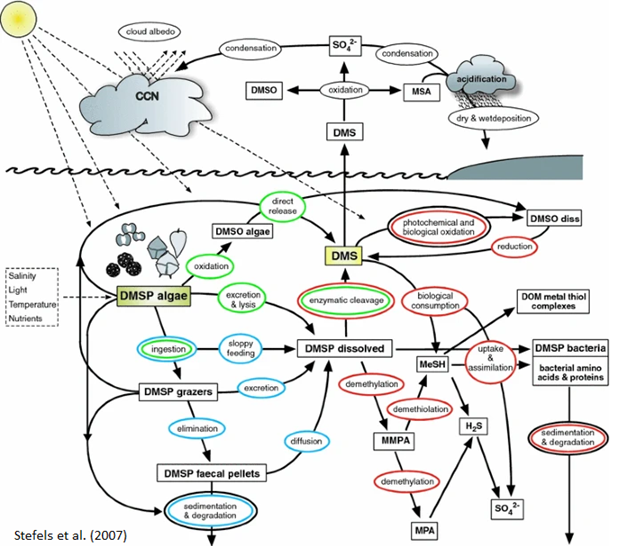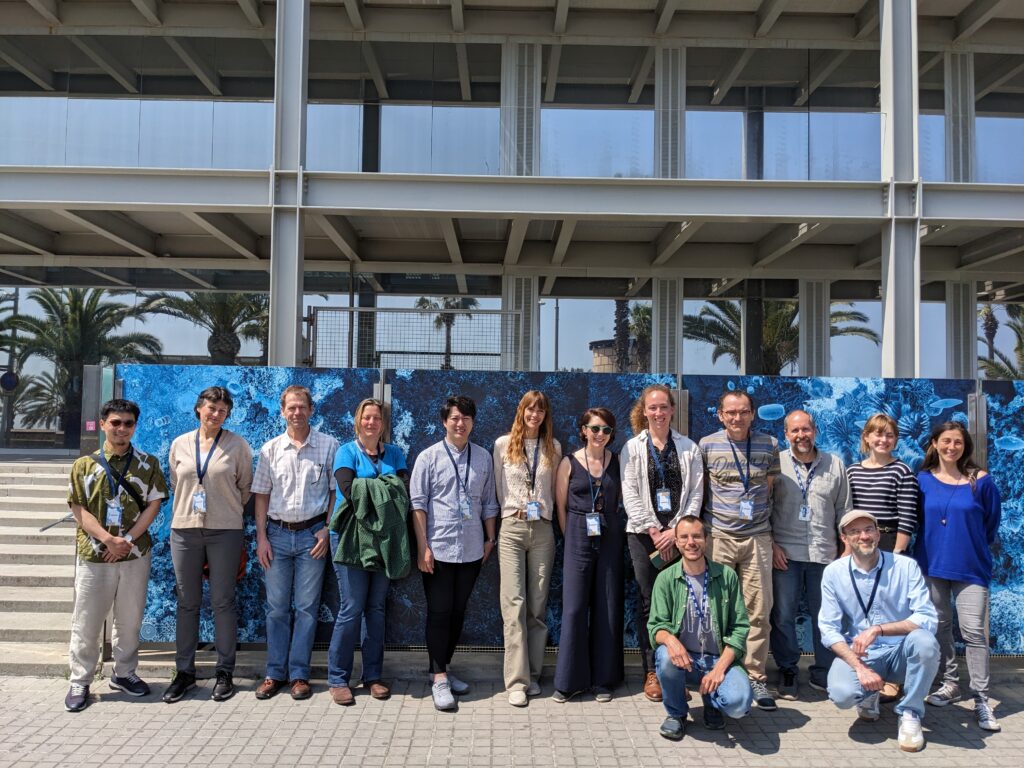About DMS-PRO
One of the main objectives of the DMS-PRO working group is to establish a comprehensive and open-access database of quality-controlled MSC cycling rates. DMS-PRO will fully evaluate the analytical procedures and uncertainties in the quantification of MSC cycling rates and will synthesize and publish its findings and recommendations on standardized operating practices.
The overarching objective of DMS-PRO is to establish an international community of practice focused on research, capacity development, and oceanographic multidisciplinary collaboration focused on the oceanic biogeochemical sulfur cycle.
Objectives
Organic methylated sulfur compounds (MSCs) play key roles in planktonic food webs as important carbon and sulfur substrates and also as infochemicals that mediate biological interactions. In addition, the oceanic emission of biogenic volatile MSCs to the atmosphere acts as a source of aerosols, which impact cloud formation and properties, and hence climate. In order to understand the role of MSCs in the Earth system, it is essential to have access to accurate rate measurements of the biotic and abiotic processes involved in the cycling of these compounds.
DMS-PRO stands for “Developing resources for the study of Methylated Sulfur compound cycling PROcesses in the ocean (DMS-PRO)” and it is a SCOR-sponsored working group, created in 2023.

The cycling of organic methylated sulfur compounds in the global ocean is regulated by complex abiotic and biotic interactions that cross trophic levels and kingdoms. While many of the most important mechanisms regulating the flux of these molecules are shown here, the group will also update the figure with new mechanisms discovered in the last two decades. The goal of DMS-PRO is to develop a resource to best quantify the fluxes of MSCs as depicted in the figure by the many different arrows. The quality-controlled open-access database will define these arrows with all previous rate measurements, and, critically, provide bounds of uncertainties in order to best inform future experimental and modeling efforts.
Recent / Past Events
Marine Sulfur Cycling Workshops
In September and October 2024, we organized three workshops, each featuring two invited speakers. These sessions provided a great opportunity to discuss a broad range of topics, laying the groundwork for developing Standard Operating Procedures (SOPs) for measuring methylated sulfur compound cycling processes in the ocean. The presentations and Q&A sessions are available on our YouTube channel (hyperking to https://www.youtube.com/@DMS-PRO), and we hope they serve as a valuable resource for the marine sulfur cycle community and beyond.

First In-Person Meeting
In April 2025, we held the first hybrid (in-person and online) meeting of the DMS-PRO working group at ICM-CSIC in Barcelona, Spain. Over three productive days, we collaborated intensively to advance key deliverables, including the SOPs and the database, and engaged in discussions on the broader topic of oceanic sulfur cycling. We were also joined by colleagues from the broader scientific reduced sulfur community, whose participation enriched the discussions and perspectives. Beyond the work, we spent valuable time together, further strengthening our sense of community.

DMS-PRO Members
DMS-PRO has members from 14 different countries, with complementary expertise in the fields of chemical and microbial oceanography, molecular microbiology, photochemistry, sea-air exchange, biogeochemical modeling, and database setup and management

Martí Galí Tàpias (co-chair) | mgali_at_icm.csic.es
Daniela del Valle co-chair) | ddelvalle_at_inidep.edu.ar
Steve Archer | sarcher_at_bigelow.org
Hermann Bange | hbange_at_geomar.de
Eva Bucciarelli | bucciare_at_univ-brest.fr
Liz Deschaseaux* | elisabeth.deschaseaux_at_scu.edu.au
José González | jmglezh_at_ull.edu.es
Frances Hopkins | fhop_at_pml.ac.uk
Hakase Hayashida* | hakase.hayashida_at_utas.edu.au
Sohiko Kameyama | skameyama_at_ees.hokudai.ac.jp
Brandon McNabb* | bmcnabb_at_eoas.ubc.ca
Ki-Tae Park | ktpark_at_kopri.re.kr
Erin McParland* | erin.mcparland_at_oregonstate.edu
Damodar M Shenoy | dmshenoy_at_nio.org
Jacqueline Stefels | j.stefels_at_rug.nl
Jon Todd | Jonathan.Todd_at_uea.ac.uk
Lenny Winkel | lenny.winkel_at_eawag.ch
Gui-Peng Yang | gpyang_at_ouc.edu.cn
Marcos Zárate* | zarate_at_cenpat-conicet.gob.ar
Miming Zhang* | zhangmiming_at_tio.org.cn
*Early career researchers
Resources
Ongoing projects with DMS-PRO members’ participation
Understanding of Antarctic climate and environment and assessments of global influence – Ki Tae Park
Cooling and Shading subprogram of the Reef Restoration and Adaption Program – Elisabeth Deschaseaux
Monthly DMS/P/O measurements at the time-series station Boknis Eck – Hermann Bange
Climate cooling gas DMS in Antarctic snow, sea ice and underlying seawater: data collation – Hakase Hayashida
Constraining the role of the marine sulfur cycle in the Earth System (CARES) – Frances Hopkins
Carbon sequestration using natural Buoyant flakes – Damodar Shenoy
DMSP synthesis by cyanobacteria and diverse bacteria – Jonathan Todd
Se metabolism by algae in comparison to S metabolism – involves exploring the role of DMSP vs DMSeP – Lenny Winkel
Gaps in the Observation of Ocean Sulfur Emission and its modeling (GOOSE) – Martí Galí
Links
SCOR
SCOR working group 166: DMS-PRO
SOLAS (Surface Ocean – Lower Atmosphere Study)
Contact
The WG welcomes suggestions and inputs from the community through direct email with individual members or via the Working Group email address dmspro.scor@gmail.com
